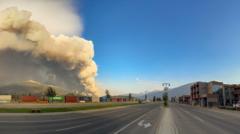A huge wildfire may have destroyed up to half of the Canadian town of Jasper, officials have. The fires in Jasper National Park, which were sparked earlier this week, forced about 25,000 people to flee the area earlier this week, officials said on Thursday. Some 400 firefighters from around the world are on their way to Canada to help battle the flames.
Officials warned that there are only limited details currently available on which structures were damaged, and that the focus is on containing the flames and preventing further destruction. Alberta Premier Danielle Smith said during an emotional press conference that the township of Jasper would require a "significant rebuild". She said Jasper and the surrounding area had been a "source of pride with some of the most beautiful scenery in the world" and promised residents "we will recover from this".

Jasper's mayor, Richard Ireland, said that the wildfire has "ravaged our small, tight-knit mountain community". He said his town was still coming to terms with the wildfire. Jasper National Park is the largest in the Canadian Rockies.
The resort town bearing its name has about 5,000 residents, but the park had almost 2.5m visitors last year. Hundreds of firefighters are flying in to help with the efforts, including 100 from Jalisco, Mexico, 200 from South Africa and 100 from Australia and New Zealand.
Justin Trudeau, Canada's prime minister, thanked first responders for their response to the wildfires. "As the heartbreaking images from Jasper emerge, I want to thank the brave first responders who are in Alberta right now, fighting to save every home and every community they can," he said on social media. Pierre Martel, director for the national fire management programme at Parks Canada, said the fire was started by a lightning storm and escalated on Wednesday, fanned by powerful wind gusts.
"It [was] just a monster at that point," Mr Martel said. "There are no tools we have in our tool box to deal with it." The fire reached 100m (328ft) high, covering "an inordinate amount of space in a very little amount of time," one official said.
Mike Ellis, Alberta's minister for public safety, said the fire was 5km (three miles) outside of Jasper when it was pushed by powerful gusts to the town in "less than 30 minutes". "Any firefighter will tell you there is little to nothing you can do when you have a wall of flames coming at you like that," he said. "Nobody anticipated that fire to come so fast, so large and so quickly.
" Karyn Decore, the owner of the Maligne Lodge in Jasper, was on holiday when she learned the hotel had burned down. She said staff received an evacuation order and had gone door-to-door until 02:00 local time to ensure all visitors and staff were notified and ready to leave. Managers helped around 100 staff - many of whom are foreign and without transport - get out of the city towards the nearby province of British Columbia.
On Wednesday night, she received a photograph of the lodge in flames. "I was horrified and devastated when I saw that photo," she told the BBC. "I think it's going to take a couple of days for the shock to wear down.
" "It's our intention to rebuild," she added. BBC journalist Wendy Hurrell was in Jasper National Park when the fires began to burn on Monday. She, her husband and daughter drove through the night in a rush to leave town.
"The storm was ferocious - the skies went dark red and there were whipping winds, fierce rain and lightning," she said. "We are some of the last travellers to see Jasper in its full beauty - it will be a very long time before it will recover. It's utterly devastating for them all and my heart is breaking.
" Environment Canada said there might soon be some reprieve from the hot and dry weather, which allowed the fire to grow, as 1cm to 2cm of rain was expected on Thursday. Firefighters, support personnel, water trucks, a dozer group, helicopters and airtankers have all been sent to help fight the blaze. There are more than 170 active wildfires in Alberta, triggering air quality alerts in multiple areas.
This marks another year of difficult fire conditions for the province. Last year, a record 2.2 million hectares burned in Alberta between 1 March and 31 October.
Outside Alberta, there are more than 45 active blazes in British Columbia and fires are burning in California, Oregon, Montana and Utah in the US. In California, one man was arrested for allegedly pushing a burning car into a ravine, which sparked a fire that has so far burned some 70,000 acres near the city of Chico, authorities said on Thursday. In Oregon, the Durkee Fire, the largest currently in the US, is burning near Idaho border.
Scientists have longed pointed to human-led climate change as the cause of worsening natural disasters including wildfires. With additional reporting from Nadine Yousef, Eloise Alanna and Ottilie Mitchell.



















